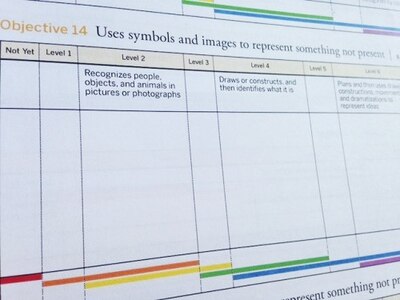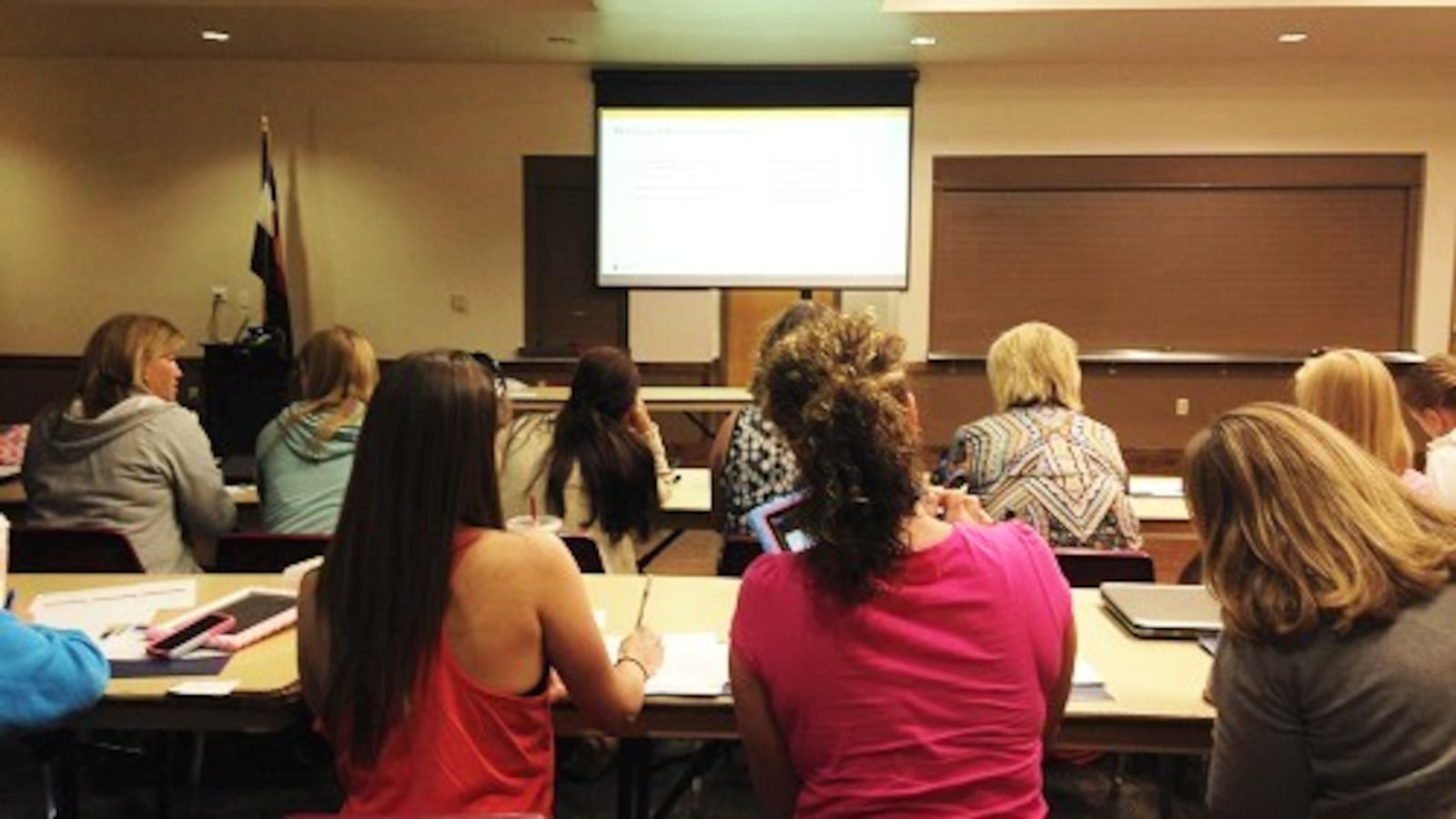On a recent Wednesday morning, Lori Sabian asked the two dozen teachers and principals seated before her what they had heard about Teaching Strategies GOLD, the early childhood assessment she would be training them on for the rest of the day.
Sensing hesitation, she added a reassurance: “This is a room of truth,” she said.
Then one teacher piped up with the advice she’d been given: “Run, run run!”
It was by no means the only opinion about the online tool, but it summed up the trepidation that many kindergarten teachers feel as they prepare to pilot the “school readiness assessment” this year in advance of mandatory statewide implementation next year.
This broad implementation — one component of a six-year-old school reform law — comes against the backdrop of ongoing concerns about the state’s “testing burden” as well as questions about the security of student data. It also unfolds on the heels of new K-3 literacy assessments required under the READ Act.
Even the educators who are excited about using Teaching Strategies GOLD to tailor instruction or provide better feedback to parents admitted to feeling overwhelmed by the time-consuming task ahead of them. One teacher at the recent training in Evans asked Sabian for something of a pep talk as she wondered how she would assess the nearly 40 students in her two half-day kindergarten classes.
“Can you just say something to keep me positive?” she asked.
Others in the room were more circumspect.
“We’ve always done assessment. We’ve always done data collection. And this just feels like a nice model that pulls everything together,” said Julie Claeys, assistant elementary principal and K-12 assessment coordinator for Union Colony Preparatory School in Greeley.
“Yes, it’s going to be a lot of work to learn but I’m really grateful that we have this first year where messing up isn’t fatal.”
Where did it come from?
Across the country, states are increasingly adopting school readiness assessments, also called Kindergarten Entry Assessments. In Colorado, the mandate was born out of a major piece of school reform legislation passed in 2008—the Colorado Achievement Plan for Kids, or CAP4K.

The law required that all kindergarteners have an “individualized readiness plan” informed by a valid, reliable and research-based school readiness assessment. While the law included no funding for the assessments, the state is using $1.2 million from its $44 million federal Race to the Top grant to cover implementation costs.
For state leaders, school readiness assessments like TS GOLD represent a more effective way to track and address the many domains of child development. These include social-emotional, cognitive, language and physical development, as well as academics such as literacy and math.
“If we have a great assessment system that addresses the whole child that way, I think it’s going to inform practice and start to give kids a better foundation,” said Sharon Triolo-Moloney, director of the Office of Early Learning and School Readiness at the Colorado Department of Education.
Claeys described the information provided by TS GOLD, saying, “It’s like having an [Individual Education Plan] for every kid,” referring to plans for students with special needs.
Unlike other kinds of standardized tests, most kids won’t even know they’re “taking” a school readiness assessment like TS GOLD. That’s because it involves a year-long process of observation and documentation of what students are doing in the normal order of their school day. This might mean counting to 100, retelling the story of “The Three Little Pigs,” resolving a squabble with peers, or using a quiet voice when visiting the library.
For the most part, the burden of completing the assessment rests on teachers, who will be responsible for taking regular notes, photos and videos, uploading them to the TS GOLD platform and categorizing them appropriately. Three times a year—around Halloween, Valentine’s Day and Mother’s Day—there are “progress checkpoints” where teachers determine how students compare to other children of the same age.
Because it’s a system that punishes procrastinators, Sabian and other speakers at the training frequently warned teachers not to let data—say, photos of student work or sticky notes describing a teacher-student interaction—pile up without being entered online.
“Don’t let it stockpile,” said Emily Kielmayer, an early adopter from the Garfield School District, recounting her own trials with entering lots of data at the last minute.
At the same time, she talked enthusiastically about how TS GOLD helped her work with struggling students who’d simply scored zeroes on other assessments. With TS GOLD’s birth-kindergarten continuum, it was easier to find a jumping off point for instruction.
Gradual roll-out
Both last year and this year are voluntary phase-in years for TS GOLD, with an emphasis on experimentation and flexibility. For example, teachers can focus on just three or four of the nine developmental areas covered by TS GOLD, or assess only a handful of students instead of the whole class.
State officials estimate that nearly 1,200 teachers in 103 of the state’s 178 school districts will use TS GOLD this year. Starting next year, all Colorado kindergartners must be assessed, though leaders in some districts are hoping to be circumvent that requirement. Last winter, the conservative-leaning Jeffco Public Schools board of education voted to seek a waiver from TS GOLD’s use in kindergarten.
While the state didn’t grant that waiver, district administrators are waiting to see what other school readiness assessments might be approved in advance of next year’s mandatory implementation. Four other assessments are currently under consideration, but a final decision isn’t expected from the State Board of Education until sometime this fall.
“I know there’s a big push for something that’s easier,” said Cheryl Caldwell, director of early education for Denver Public Schools.
Still, she doubted that quicker, easier assessments would look at the whole child in the comprehensive way that TS GOLD or similar assessments do.
As is typical for online assessment systems, TS GOLD charges a per-student fee—it’s around $9 in Colorado. This year, like last year, the state will cover those costs completely in implementing districts. Next year, the state will cover at least 60 percent of the costs; the following year, that number will drop to around 30 percent.
Many veteran users in the state
While TS GOLD may be new to most kindergarten teachers, a fair chunk of Colorado’s preschool workforce is already familiar with the assessment. That’s because it’s been used for two years, and sometimes longer, in classrooms funded by the Colorado Preschool Program or CPP. (Another approved tool—the Child Observation Record or COR—is used in about 9 percent of CPP classrooms.)
Ilona Witty, director of early childhood in the Salida School District, said her staff has used TS GOLD for five years to assess the district’s preschool students and the last three years for its toddlers. It was stressful at first, but the early childhood team gradually learned shortcuts that made the process more efficient, she said. Getting iPads helped too.
In Denver Public Schools, where around 300 kindergarten teachers will pilot TS GOLD with at least five students each this year, administrators believe preschool teachers will be a good resource for the kindergarten adopters. District officials also say they’ve focused on the purpose of the assessment at trainings this summer.
“We talked about the why…We didn’t just talk about here’s another test and here’s how you give it,” said Caldwell.
“It’s a tool that helps…teachers really understand development and how it happens,” she said.
While Witty knows some observers worry that TS GOLD has a monopoly in the Colorado market, she’s believes the assessment is a good one that provides valuable feedback about the district’s youngest students.
“It drives our planning, it drives our ordering. It drives our professional development,” she said. “Of course they’re making a ton of money…If the product wasn’t good, I’d probably be more up in arms”
Administrators in Salida like the assessment system so much they aren’t stopping with kindergarten. In the coming years, first, and second grade classrooms will begin using a new version of TS GOLD that’s designed for children through third grade. The existing version and the one coming out for older children align with Common Core State Standards.
Sharing the data
Among the benefits of TS GOLD that most excited teachers at the Evans training was its potential to give parents more information about their children’s progress and better engage them as educational partners. Kielmeyer noted that she’d replaced report cards and parent-teacher conference forms with reports generated by TS GOLD.
“I had the best parent-teacher conferences I’ve had in the last 10 years,” she said. “I had boxes of tissues because I had parents crying tears of joy. They were just amazed at what I had to share.”
While parents have the option of asking that their child not be photographed or videotaped as part of TS GOLD, Kielmeyer and others say parents often become more receptive as they learn how those types of data are used to document progress. In fact, teachers can even invite parents to contribute to the assessment using documentation they’ve collected.
In addition to replacing report cards, Kielmeyer said that TS GOLD allowed the district to replace some of its former assessments because GOLD provided the same information. In Denver Public Schools, Caldwell said a committee is in the process of deciding whether such overlaps warrant the elimination of some assessments.
One unanswered question about TS GOLD is how the data will be used at the state level. Currently, aggregate preschool data from TS GOLD and the other approved assessment is collected through the state’s Results Matter system. A summary is published in the annual Colorado Preschool Program legislative report.
At least initially, Triolo-Moloney said there won’t be a comparable report for the state’s kindergarten cohort.
“Everybody’s chomping at the bit for that,” she said. “But we’re trying so hard to not do that because we really want teachers to be free to practice this thing.”

